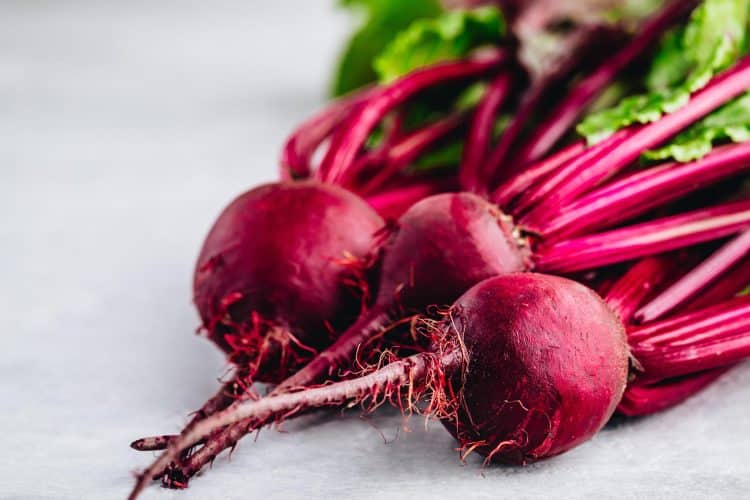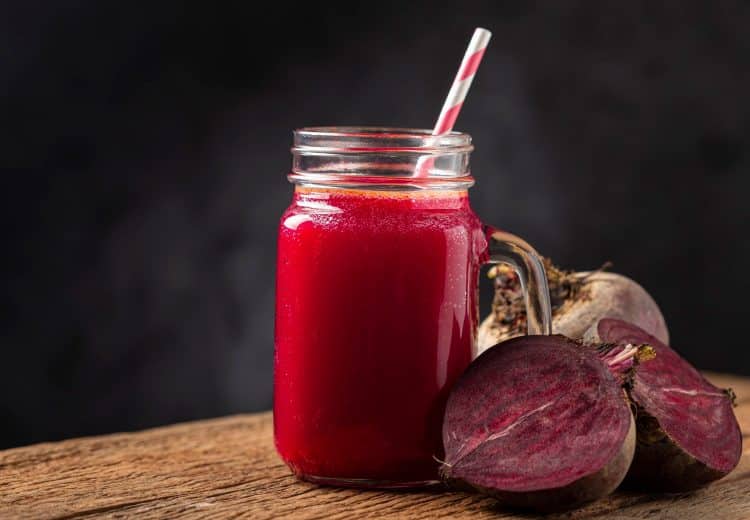Ever since Arnold Schwarzenegger famously described its joys in Pumping Iron (1977), gymgoers have been striving for ‘the pump.’ It’s the feeling you get when your muscles are blown up with blood and engorged with nutrients. If you’ve ever experienced it, you no doubt agree with Arnold that it ‘feels fantastic.’
To achieve an awesome pump, you’ve got to enlarge your blood vessels so more blood can flow to your working muscles. Recently, beetroot juice has gained popularity as a safe, natural way to do it.
In this article, we discover how effective beets are as a pre-workout food and how you can best use them to get pumped up on the gym floor.
What is a “Pump”?

The slight increase in muscle size during and after an exercise is called the “pump.” It results from increased blood flow to the muscles and fluid buildup inside the muscle cells.
The muscles need higher blood flow during a workout to receive appropriate amounts of oxygen and nutrients required for growth. The muscles’ blood vessels enlarge due to the increased blood flow, temporarily increasing the size of the muscles.
The pump effect can have some potential advantages for muscle growth and recovery, in addition to the aesthetic impact of a temporary increase in muscle size. The increased oxygen and nutrients delivered to the muscles by the increased blood flow can stimulate muscle growth.
The pump can also aid in removing waste products, such as lactic acid, from the muscles more effectively, which can accumulate during exercise and contribute to muscle fatigue.
A naturally produced gas called nitric oxide can enhance the pump by enlarging the blood vessels so more blood can flow to the working muscles.
What is Nitric Oxide?
Nitric oxide is a colorless, odorless gas that is essential to numerous physiological processes in the human body. Endothelial cells, neuron cells, immunological cells, and other types of cells all generate it.
Nitric oxide serves as a signaling molecule in the body, assisting in controlling numerous biological processes, including blood flow, neurotransmission, and immunological function. It also helps control blood pressure and the relaxation of blood vessel smooth muscle.
Pump-Inducing Effects of Beets
Vasodilation, the process of relaxing blood vessels, is enhanced by nitric oxide (NO). Endothelial cells that line the blood arteries release NO, which diffuses into the nearby smooth muscle cells and relaxes them to expand the blood vessels and improve blood flow.
Nitric oxide’s vasodilation action during exercise can boost blood flow to the muscles, promoting the pump effect in the gym. Working muscles need extra oxygen and nutrients, and they also produce waste that must be removed. Improving blood flow eliminates waste materials more effectively while providing more oxygen and nutrients to the muscles. [1]
The increased blood flow can also result in a temporary increase in muscle size and strength. This is because the increased blood flow and nutrient delivery to the muscles can cause them to swell temporarily, leading to a feeling of tightness and fullness.
Many athletes and bodybuilders use supplements containing ingredients such as L-arginine, a precursor to nitric oxide, or other NO-boosting compounds, to enhance the pump effect during workouts.
Are Beets a Good Source of Nitrates?
Beets are a good source of nitrates, which the body can transform into nitric oxide (NO). Natural sources of nitrates include leafy greens, beetroots, celery, radishes, and carrots. Beetroot juice and powder are particularly high in nitrate content. [2]
Beets’ nitrates are transformed from nitrites to nitric oxide in the body after consumption by bacteria in the mouth.

Other Beet Benefits
Beets do more than increase your blood flow. Here are four other ways they can improve your workouts:
- Increased Endurance: Nitric oxide can help increase endurance. According to several studies, eating beetroots or drinking beetroot juice might increase exercise endurance and lower the oxygen required to complete a task. [3]
- More Energy: Beetroots contain natural sugars that the body can use as a rapid energy source during activity. This can lessen tiredness and enhance performance. [4]
- Less Inflammation: Beets are abundant in antioxidants and anti-inflammatory substances, leading to less oxidative stress and inflammation. This may hasten recuperation and lessen post-exercise muscular discomfort.
- Lower Blood Pressure: Nitric oxide can assist in dilating blood vessels and lowering blood pressure, which can enhance cardiovascular health and exercise capacity. [5]
Are Nitrates Bad for You?
Nitrates can be dangerous at high concentrations; however, most people are generally deemed safe for the little amounts typically present in their diet. However, nitrates and specific bacteria in the body can mix to make nitrites, which can then combine with other chemicals to create nitrosamines. In experiments on animals, several nitrosamines were found to be carcinogenic or capable of causing cancer.
Large amounts of nitrate-containing meals or processed meats with added nitrates may raise the chance of developing certain diseases, such as cancer, digestive difficulties, and cardiovascular disease.
Should You Drink Beetroot Juice as a Pre-Workout?

Beetroot juice has gained popularity as a pre-workout drink due to its potential performance-enhancing effects. Beetroot juice contains high levels of nitrates, which are converted into nitric oxide in the body.
Several studies have suggested that drinking beetroot juice before exercise can improve endurance and reduce the oxygen needed to perform a task. However, the research on the effects of beetroot juice on exercise performance is still somewhat mixed, and the results can vary depending on the individual.
The quantity of beetroot juice you should consume to raise your nitric oxide levels will vary depending on several variables, including your body weight, your response, the brand and concentration of the juice, and other considerations.
Yet, most studies have discovered that ingesting 2 cups (500 ml) or more of beetroot juice daily for a few days will boost nitric oxide levels and enhance exercise performance.
It is typically advised to drink beetroot juice 1-2 hours before exercise. This may allow enough time for your body to produce nitric oxide from the nitrates in the beetroot juice and enjoy any potential advantages while exercising.
If you’re searching for a pre-workout supplement, we recommend looking for one that contains beetroots or beetroot extract to boost the vasodilation effects of the product.
FAQs
Is beetroot juice good for building muscle?
Beetroot juice may offer some potential advantages for muscle growth.
As previously explained, beetroot juice is abundant in nitrates, which the body can transform into nitric oxide. Nitric oxide can boost blood flow to the muscles and oxygen supply, improving exercise performance and supporting muscle growth.
Beets also contain natural sugars, which the body can use as a rapid energy source when exercising. You’ll be able to exert more effort throughout workouts due to improved performance and decreased weariness.
Moreover, the anti-inflammatory and antioxidant qualities of beetroots may aid in reducing post-exercise muscle damage and pain, which may stimulate muscle growth and repair.
How long before my workout should I take beet juice?
It is advised to drink beetroot juice one to two hours before working out. This can allow your body ample time to produce nitric oxide from the nitrates in the juice and experience any potential advantages while exercising.
Yet, some research has indicated that taking beetroot juice for a few days before a workout may also be advantageous for improving exercise performance. For instance, it has been demonstrated that taking 2 cups (500 ml) of beetroot juice daily for a few days before exercise may raise nitric oxide levels and enhance exercise endurance.
Also, it’s critical to remember that the effects of beetroot juice might change based on the person, the precise brand and juice content, and other elements. We recommend experimenting with different dosages to discover what works best for you.
[sc name=”style-summary2″ ]
Related:
If you’re interested in knowing more about pre-workout supplements, we suggest checking out our dedicated pre-workout section.
- Best Pre-Workouts for Weight Loss
- Best Pre-Workouts Without Creatine
- Best Tasting Pre-Workout Supplements
- Strongest Pre Workout Supplements
- Best All-Natural Pre-Workouts
- Best Caffeine-Free Pre-Workout Supplements
[/sc]
Summary
Beet juice has become a popular pre-workout food due to its vasodilation properties. By stimulating the body to produce nitric oxide, it expands blood vessels, allowing more blood and nutrients to flow to the working muscles. This gives you a better pump and enhances post-workout muscle recovery.
To see if beet juice will improve your workouts, we recommend taking two cups (500 ml) about an hour before your workout. Then experiment with different dosages to find what gives you the best results.
References
- Maiorana A, O’Driscoll G, Taylor R, Green D. Exercise and the nitric oxide vasodilator system. Sports Med. 2003;33(14):1013-35. doi: 10.2165/00007256-200333140-00001. PMID: 14599231.
- Zamani H, de Joode MEJR, Hossein IJ, Henckens NFT, Guggeis MA, Berends JE, de Kok TMCM, van Breda SGJ. The benefits and risks of beetroot juice consumption: a systematic review. Crit Rev Food Sci Nutr. 2021;61(5):788-804. doi: 10.1080/10408398.2020.1746629. Epub 2020 Apr 15. PMID: 32292042.
- Wylie LJ, et al. Dietary nitrate supplementation improves team sport-specific intense intermittent exercise performance. Eur J Appl Physiol. 2013 Jul;113(7):1673-84.
- Lansley KE, et al. Dietary nitrate supplementation reduces the O2 cost of walking and running: a placebo-controlled study. J Appl Physiol (1985). 2011 Mar;110(3):591-600.
- Kelly J, et al. Effects of short-term dietary nitrate supplementation on blood pressure, O2 uptake kinetics, and muscle and cognitive function in older adults. Am J Physiol


